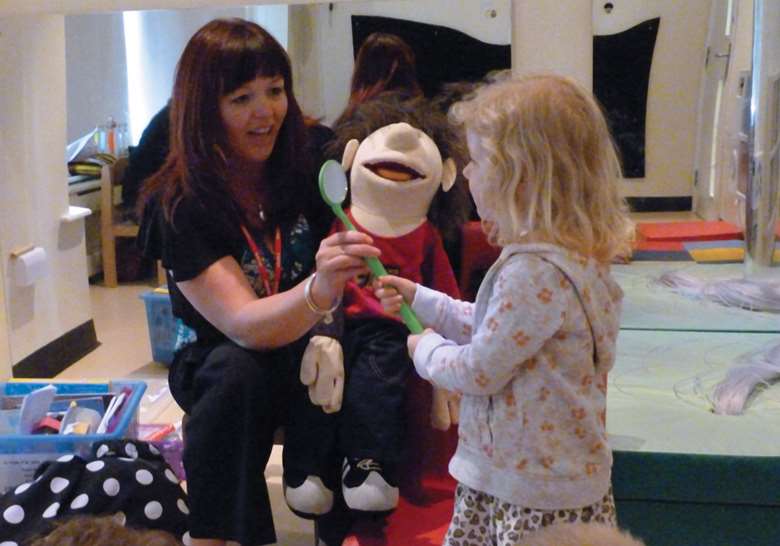Good Idea: Play sessions help children to brush up on oral health
Laura McCardle
Tuesday, October 28, 2014
A project is going into nurseries and schools to teach young children about the importance of looking after their teeth by using puppets and games to make it fun.

Name Dental Playbox
Provider Action for Sick Children
Dressing up in sets of dentists' scrubs and playing with puppets isn't all fun and games for under-fives at nurseries and schools in Manchester.
Through Action for Sick Children's Dental Playbox project, thousands of young children are brushing up on their knowledge of dental hygiene too.
Launched in 2007 by the charity's former chair Pamela Barnes in response to increasing numbers of young children being hospitalised because of tooth decay, the project aims to improve the dental health of the region's youngest children.
Latest figures from Public Health England, published in September, show that 12 per cent of three-year-olds have visible tooth decay.
In addition, Action for Sick Children claims that 46 per cent of five-year-olds have experienced tooth decay and that 60 per cent of nine-year-olds have fillings or decayed teeth.
"There has been much debate about children's oral health," explains Teresa Dooley, manager of the Dental Playbox project.
"The number of children with dental problems is growing at an alarming rate, putting an even greater strain on the healthcare industry."
In an attempt to tackle this, Action for Sick Children visits playgroups, nurseries and schools, raising awareness of dental health and reinforcing the importance of visiting the dentist. Trained facilitators lead hour-long sessions, teaching young children about the importance of dental hygiene through play.
"It is usually 45 minutes of free play and role play, where the children can do things like taste toothpaste," explains Val Jackson, chief executive of Action for Sick Children.
"Then at the end we have some storytelling."
Jackson explains the facilitators use a series of puppets to educate the children, pretending that the fictional characters are shy of talking directly to them and that the practitioners are conveying their messages on their behalf.
She says the method has proved to be an invaluable way of gaining and keeping the children's attention.
"They (the children) respond because they think it is the puppet that's talking to them," Jackson explains.
"They (the puppets) all have teeth and the facilitators will use them to explain how you brush a set of teeth."
As part of the initiative, Action for Sick Children is working with product design students at the University of Salford to design a child-friendly toothbrush holder. The aim of the work is to design a fun and visually engaging product that will encourage children to adopt a good dental hygiene routine.
Through its Dental Playbox project, the charity reaches an average of 7,000 children in the Greater Manchester area every year but Jackson says it's not enough.
From early 2015, she will start work to expand the project's geographical reach and has ambitious plans to establish the Dental Playbox as a national initiative.
Explaining why the project is so important, Jackson offers an example of a young child being admitted to hospital for dental extraction.
"We've had a child - a three-year-old - who had all 10 top teeth removed," she says.
"He told a facilitator his mum said it didn't matter because they were only milk teeth and would grow back."
In this case, Jackson says the practitioner took the unusual step of sending the child home with advice and guidance, and warned his teacher that there was a need for extra support at home.
Usually, she says, facilitators will leave a resource pack, which includes puppets, dental equipment and bookmarks, for teachers to continue the children's dental health education, embedding it within their early years curriculum.
"The underlying point (of our work) is to help children lose the fear of going to the dentist and we want to keep children out of hospital - that three-year-old went under general anaesthetic," Jackson explains.
In addition to expanding the reach of the project, Jackson wants to start delivering targeted sessions with young children with special educational needs (SEN).
"One of the key things we want to look at is driving it (Dental Playbox) forward with SEN," she says. "Because of the difficulty children with SEN suffer, life can be very stressful for parents and we would like to alleviate some of that stress."




